 On July 11, Beijing — The “Community with a
Shared Future for Mankind and the University of Human Maternal Love:
Chinese-Style Educational Innovation Based on a Beautiful Global Future”
International Exchange Conference was held in Beijing. The event was co-hosted
by the Beijing Changier Education Foundation, an NGO with Special Consultative
Status with the United Nations Economic and Social Council, and the Institute
for a Community with a Shared Future at Communication University of China.
On July 11, Beijing — The “Community with a
Shared Future for Mankind and the University of Human Maternal Love:
Chinese-Style Educational Innovation Based on a Beautiful Global Future”
International Exchange Conference was held in Beijing. The event was co-hosted
by the Beijing Changier Education Foundation, an NGO with Special Consultative
Status with the United Nations Economic and Social Council, and the Institute
for a Community with a Shared Future at Communication University of China.
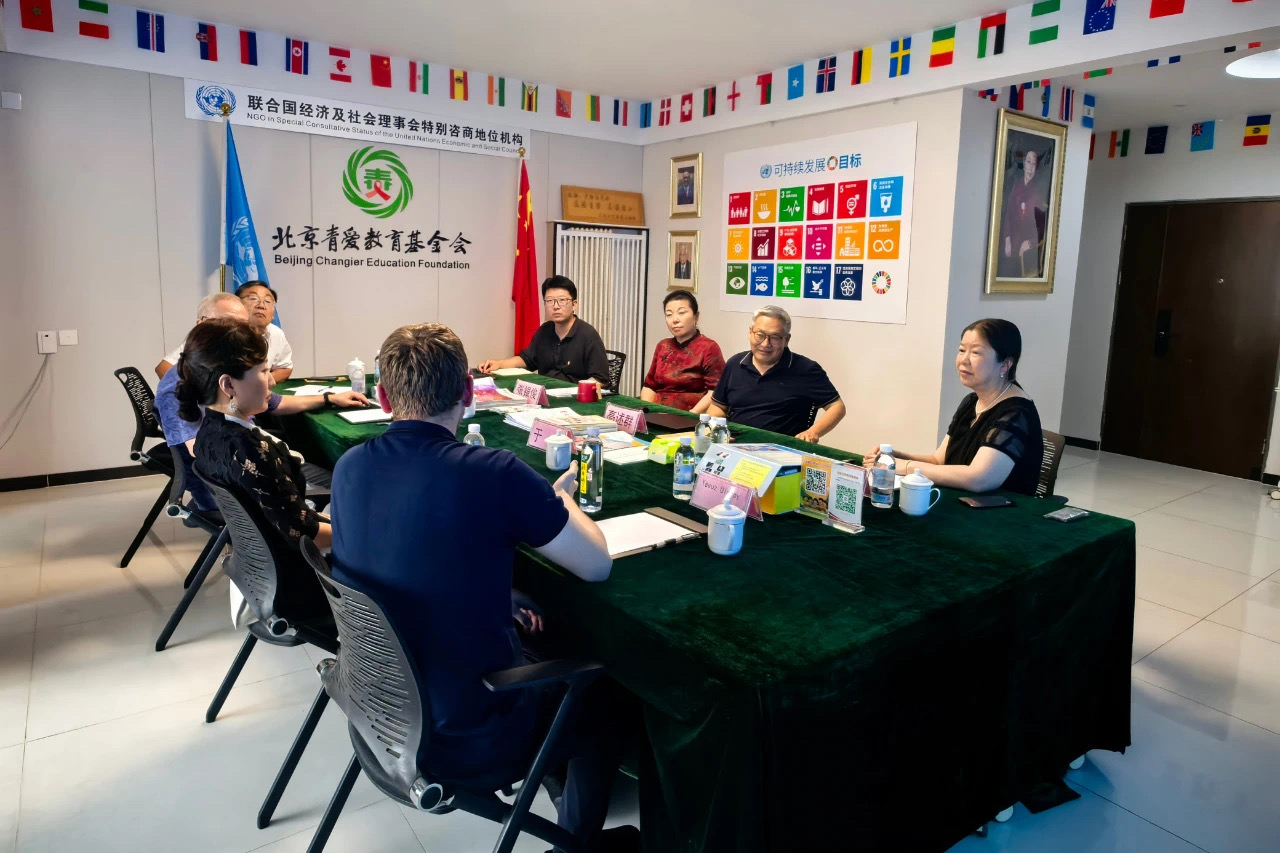 Attendees included: Zhang Yinjun, President of
the Beijing Changier Education Foundation and Council Member of the China
Economic and Social Council; Wang Sixin, Vice President of the Institute for a
Community with a Shared Future at Communication University of China; Yu Bin,
Education Officer at the UNESCO Beijing Office; Gao Shuqun, Honorary President
of the Beijing Changier Education Foundation and Deputy Director of the Center
for Cross-Civilization Dialogue at Shandong University; Guan Shanyuan, former
Deputy General Manager of China National Agricultural Reclamation Group and
long-term Africa representative; Jin Lijie, Council Member of the Beijing
Changier Education Foundation and longtime international trade representative;
Turkish youth representative Yavuz Turgut Ulusoy; and Wang Changkun, Director of
the International Department of the Beijing Changier Education Foundation. The
conference was moderated by Gao Shuqun. On July 9, on behalf of President Zhang
Yinjun, Gao Shuqun visited the Institute for a Community with a Shared Future at
Communication University of China, where he was warmly received by President Li
Huailiang and Vice President Wang Sixin. This conference was jointly organized
at the invitation of the Beijing Changier Education Foundation.
Attendees included: Zhang Yinjun, President of
the Beijing Changier Education Foundation and Council Member of the China
Economic and Social Council; Wang Sixin, Vice President of the Institute for a
Community with a Shared Future at Communication University of China; Yu Bin,
Education Officer at the UNESCO Beijing Office; Gao Shuqun, Honorary President
of the Beijing Changier Education Foundation and Deputy Director of the Center
for Cross-Civilization Dialogue at Shandong University; Guan Shanyuan, former
Deputy General Manager of China National Agricultural Reclamation Group and
long-term Africa representative; Jin Lijie, Council Member of the Beijing
Changier Education Foundation and longtime international trade representative;
Turkish youth representative Yavuz Turgut Ulusoy; and Wang Changkun, Director of
the International Department of the Beijing Changier Education Foundation. The
conference was moderated by Gao Shuqun. On July 9, on behalf of President Zhang
Yinjun, Gao Shuqun visited the Institute for a Community with a Shared Future at
Communication University of China, where he was warmly received by President Li
Huailiang and Vice President Wang Sixin. This conference was jointly organized
at the invitation of the Beijing Changier Education Foundation.
President Zhang Yinjun first introduced the twenty-year journey of leading the creation of the China Youth AIDS Prevention Education Project and the Family-Nation Heritage—Maternal Love Education Innovation Project, and focused on the original intention and mission of initiating the establishment of the University of Human Maternal Love by the Beijing Changier Education Foundation.
Vice President Wang Sixin introduced the main work carried out by the Institute for a Community with a Shared Future at Communication University of China since its establishment in 2019, as well as the development of similar institutions nationwide. He emphasized the key messages from the speech delivered by Wang Yi, Member of the Political Bureau of the CPC Central Committee, Director of the Office of the Central Commission for Foreign Affairs, and Minister of Foreign Affairs, at the inauguration of the Community with a Shared Future Research Center at China Foreign Affairs University on January 2 this year, and conveyed President Li Huailiang’s expectations for this conference and future cooperation.
Yu Bin described UNESCO Beijing Office’s work in China and East Asia in areas such as intangible cultural heritage and community education.
Guan Shanyuan shared his 18 years of experience working in Africa and his expectations for the University of Human Maternal Love led by the Beijing Changier Education Foundation.
Jin Lijie introduced her years of experience in international trade in the pharmaceutical sector, especially her cooperation with Turkish partners.
Yavuz Turgut Ulusoy shared his educational cooperation experience in Turkey and expressed his wish to collaborate with the Beijing Changier Education Foundation on human maternal love education.
The conference reached important consensus on building a beautiful society for a community with a shared future for mankind, establishing the University of Human Maternal Love, and exploring Chinese-style educational innovation for a better global future.
Yu Bin remarked that this initiative demonstrates the inspiration that Eastern wisdom can bring to global education governance—transforming the “world outlook” and the “emotional bond of maternal love” into educational innovation is timely. UNESCO looks forward to this initiative becoming an important practice platform for the Global Education Compact once its framework is complete, further promoting global educational equity, inclusion, and high-quality development, and especially emphasizing the fundamental role of education in sustainable development and the importance of promoting collaborative innovation among national education systems. Yu Bin fully affirmed the significance of the University of Human Maternal Love proposed and pursued by the Beijing Changier Education Foundation, pointing out that “maternal love” is a shared human emotion, and the innovation of the University of Human Maternal Love lies in incorporating emotional education into the educational framework. This echoes the call to “redefine human connection” in UNESCO’s “Futures of Education” report (2021), and addresses the lack of emotional and gender perspectives in traditional education. In the future, this initiative may be included in the “Education 2030” best-practices case library. To reflect cultural adaptability, globalization, and depoliticization, the project can absorb excellent ideas from around the world, such as Africa’s Ubuntu philosophy and Latin America’s Buen Vivir, forming a more inclusive model. “Community education” has always been a focus of UNESCO—warming urban and rural communities with human maternal love education and improving global community governance through community talent cultivation are important contributions of Chinese-style educational innovation to all humanity, with a promising future.
Zhang Yinjun gave a special interpretation of the value and significance of the University of Human Maternal Love. She noted that “human maternal love” is a proper noun, which implicitly includes “love for other living beings.” This aligns closely with the modern concepts of a community with a shared future for mankind and a community of shared destiny for earth’s biodiversity. Emphasizing “human maternal love” means highlighting humanity as the main subject of love and virtuous action. The University of Human Maternal Love embodies the ideal of “illuminating virtue and pursuing the utmost goodness,” echoing the humanistic spirit of the Chinese classic “The Great Learning.” Thus, the “university” in the University of Human Maternal Love is a pun—a “Way of the University” imbued with Chinese humanistic spirit and aimed at global humanistic ideals. By cultivating specialized professionals for global urban and rural communities (including Maternal Love Academies) and building a beautiful society for a community with a shared future for mankind, this is the lofty and enduring goal of the University of Human Maternal Love.
Gao Shuqun emphasized several key points from a cross-cultural and cross-civilizational perspective:
First, the principal value of mothers and maternal love in building a beautiful future society for humanity. Since the industrial era, humanity and the planet’s diverse life forms have been in a tense and often adversarial relationship, the root of today’s ecological and interpersonal tensions. The absence or loss of human mothers and maternal love is a major source of ecological and environmental destruction and social conflict.
Second, the focus on family building and community governance, and on emotional and skills education for ordinary people, aligns with the spirit of the UN Educational Compact and the UN Declaration for Future Generations. While the UN is an intergovernmental organization, ordinary people need more opportunities to speak in the international community. The University of Human Maternal Love may become a new global educational innovation practice, with mothers as the main educators and maternal love as the educational core.
Third, in this era of the Chinese nation’s great rejuvenation, establishing the University of Human Maternal Love in China and for the world, and innovating and revolutionizing education from the grassroots, marks the beginning of a grand narrative of human civilization’s progress, with the beautiful and fertile Fuchun River basin as a possible main stage.
After hearing from the Turkish youth representative, Wang Sixin expressed great hope for establishing a Community with a Shared Future research institution in Turkey and for developing human maternal love education in Turkey and across Eurasia. He noted that the Institute for a Community with a Shared Future at Communication University of China has established partner organizations in over 20 countries and regions worldwide, and hopes to be invited to Turkey for future cooperation and exchange. He believes that if the University of Human Maternal Love can develop first in Turkey, it will have immeasurable significance, and he looks forward to visiting Turkey with the Beijing Changier Education Foundation.
Wang Changkun said, “I have not been at the Changier Foundation for long, but after listening to everyone’s in-depth discussions, I have a new understanding of the University of Human Maternal Love. Frankly, we are no longer limited to the traditional concept of a university, but are instead thinking: Are we building a university, or are we constructing a brain that gathers wisdom and empowers society? Currently, there are 219 Maternal Love Academies in China, Indonesia, and elsewhere, each with its own code, dean, and a rich activity and training system. These academies are realizing the core functions of a university—knowledge dissemination, vocational training, and community service—and have the natural advantage of flexible expansion and branching. Students are recommended by their communities and are themselves vital forces in community governance. Through learning at the Maternal Love Academy, they not only improve their professional skills but also continue to serve their local communities, applying what they learn and giving back to society. The unique feature of this emerging maternal love education system is that it is a grassroots, self-sustaining closed loop. This model breaks through regional and academic barriers, closely integrates philanthropy and career development, and truly achieves a virtuous cycle of ‘from the people, for the people.’ In this sense, we prefer to see the Maternal Love Academy as a ‘human maternal love brain’—not just a knowledge hub, but a gathering point for community wisdom and a source of social governance innovation. Every student and every branch is a neuron in this brain, together forming a broad, dynamic social support network. This is the ultimate goal of our pursuit of educational and social innovation.”
Zhang Yinjun concluded by expressing hope that the UNESCO Beijing Office and the Institute for a Community with a Shared Future at Communication University of China will strengthen their support and guidance for the Chinese-style educational innovation practice of the University of Human Maternal Love. She hopes to follow President Xi Jinping’s philosophy of building a community with a shared future for mankind, as well as the spirit of UNESCO’s Global Education Compact, Education 2030 Framework for Action, and Global Convention on the Recognition of Qualifications concerning Higher Education, and to conduct innovative community maternal love education experiments in China and countries of the Global South.
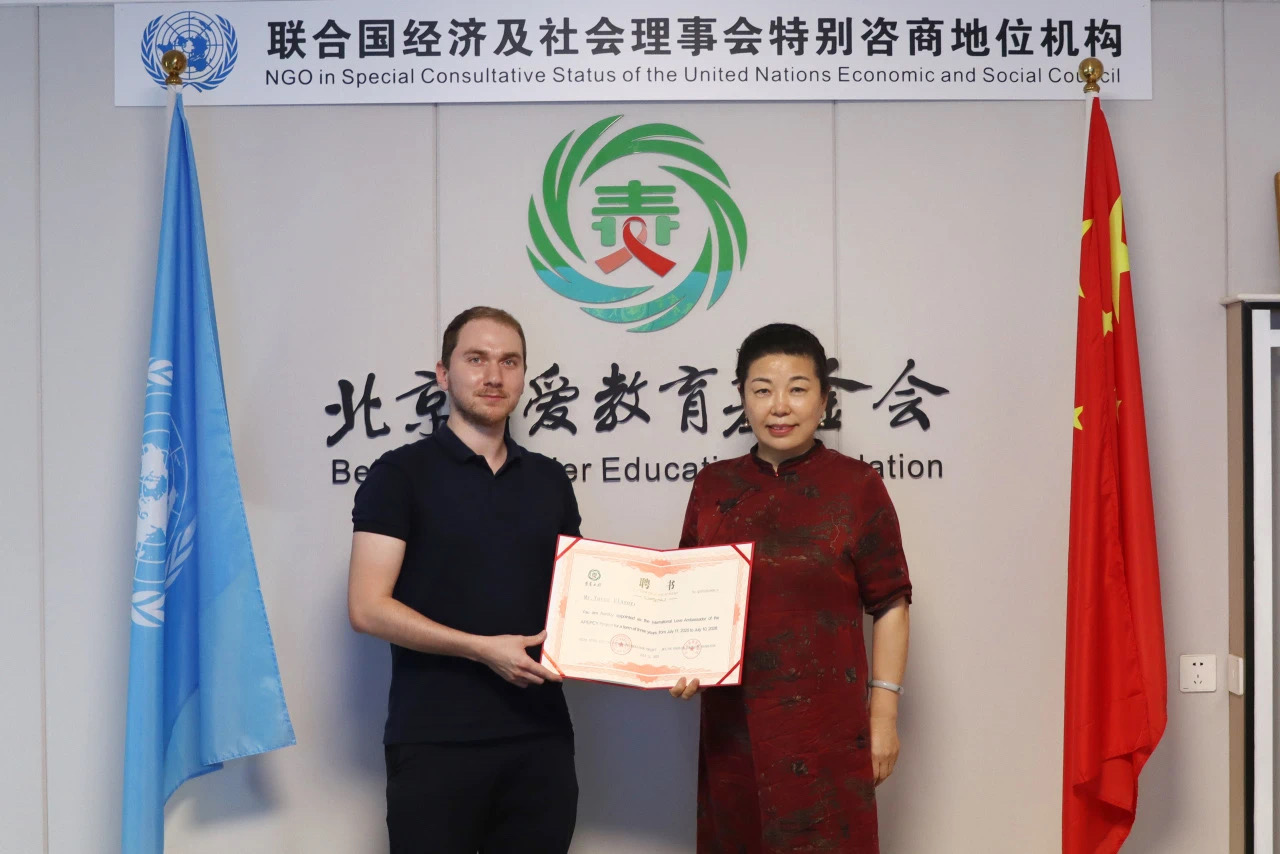 During the conference, on behalf of the Beijing
Changier Education Foundation, Zhang Yinjun presented the “APEPCY Project
International Ambassador of Love” certificate to Turkish youth representative
Yavuz Turgut Ulusoy.
During the conference, on behalf of the Beijing
Changier Education Foundation, Zhang Yinjun presented the “APEPCY Project
International Ambassador of Love” certificate to Turkish youth representative
Yavuz Turgut Ulusoy.
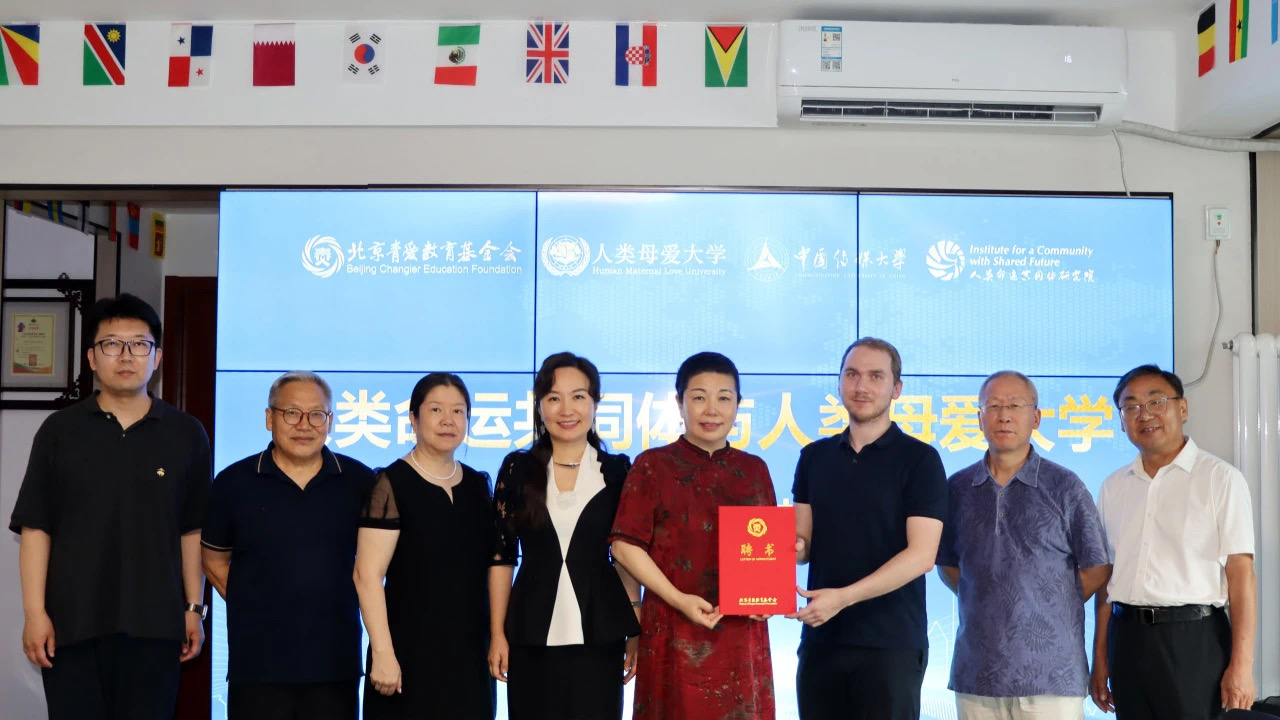 It is reported that the Institute for a
Community with a Shared Future at Communication University of China, established
in 2019, is the first higher academic research institution in China with “a
community with a shared future for mankind” as its core theme. The institute is
committed to theoretical innovation and international communication of this
concept, focusing on global governance, international communication, and
cultural exchange. It actively conducts academic research, think tank
consulting, and international cooperation, and has established partner centers
in more than 20 countries worldwide, becoming an important academic platform for
China’s international exchange and cooperation.
It is reported that the Institute for a
Community with a Shared Future at Communication University of China, established
in 2019, is the first higher academic research institution in China with “a
community with a shared future for mankind” as its core theme. The institute is
committed to theoretical innovation and international communication of this
concept, focusing on global governance, international communication, and
cultural exchange. It actively conducts academic research, think tank
consulting, and international cooperation, and has established partner centers
in more than 20 countries worldwide, becoming an important academic platform for
China’s international exchange and cooperation.
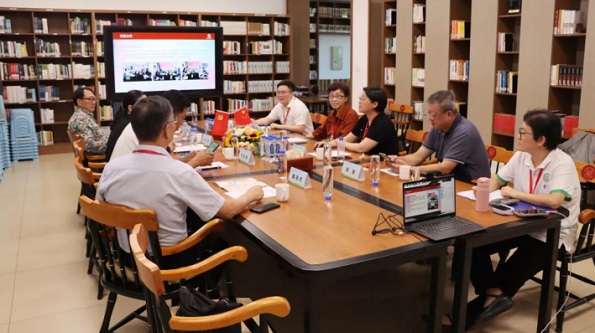
On the morning of July 21, 2024, the 15th Meeting of the Second Council of the Beijing Changier Education Foundation was...
Jul 22, 2024 Read Details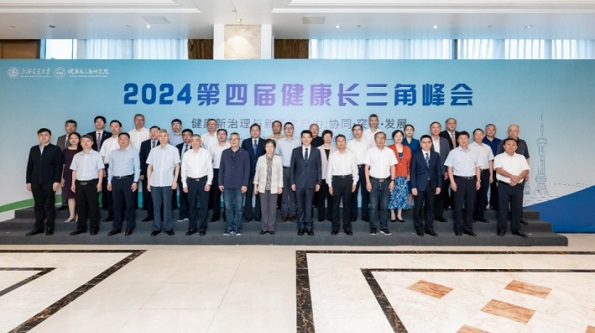
On June 22, the 2024 Fourth Yangtze River Delta Health Summit was successfully held in Hefei, Anhui Province. Yan Junqi,...
Jun 25, 2024 Read Details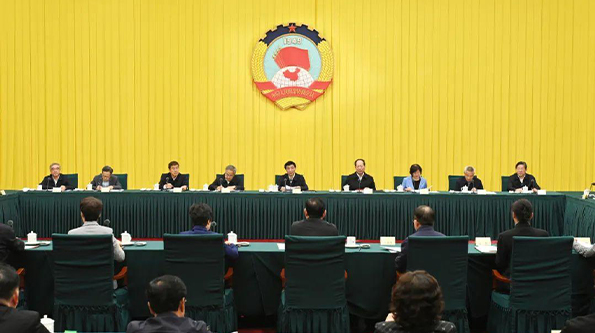
On October 18, the 24th biweekly consultation meeting of the 14th National Committee of the CPPCC was held in Beijing, c...
Oct 21, 2024 Read Details